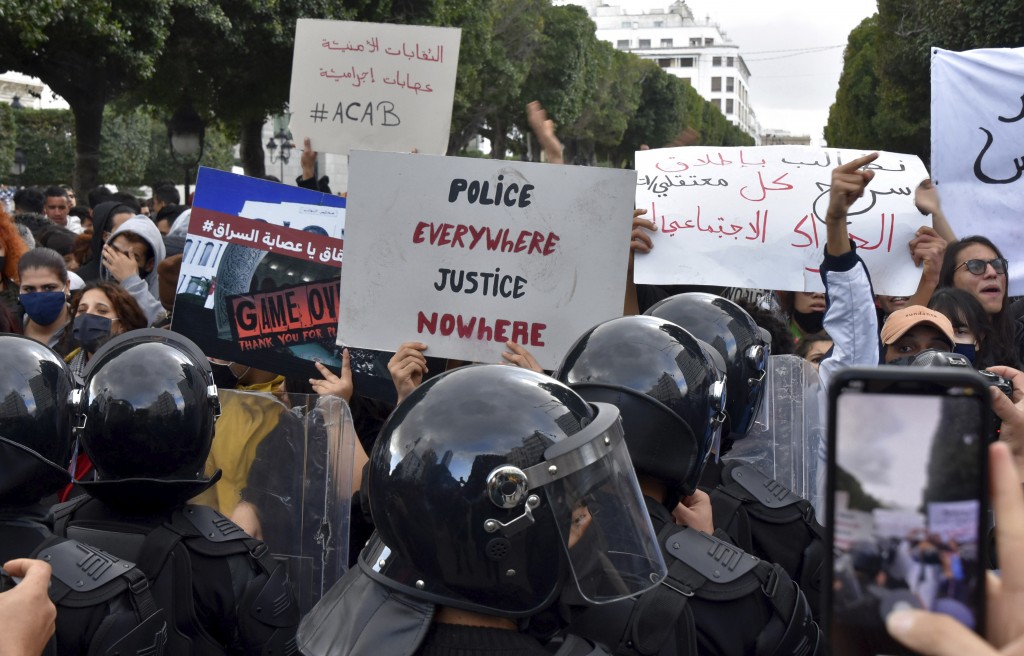On Monday protests in Tunisia against police violence reached new heights. The protests began last week after a young man died in police custody and a video circulated on social media showing the police beating an underage demonstrator, whom they forced to undress. This unleashed days of fury in working-class neighborhoods, where the repressive police forces are most brutal.
The demonstrations began June 9 in the working-class districts of Sidi Hassine and Séjoumi, in the capital city of Tunis, and spread to other neighborhoods on Monday night.
Ahmed Ben Ammar, 32, died while in police custody on June 8. Police claimed he died from marijuana use. His family rejected this explanation and said the police beat him to death.
Ammar’s death sparked immediate protests. The next day, a viral video showed police beating and stripping a young man.
According to human rights groups and activists, Tunisia’s police force is known for its endemic culture of violence, particularly in working-class and poor neighborhoods. This has not changed since the 2011 revolt that sparked the Arab Spring and brought down the repressive regime of Zine el-Abidine Ben Ali.
The protests in 2011 were triggered by the death of a young street vendor, who blew himself up on December 17, 2010, after his fruit stall was confiscated and he suffered humiliation at the hands of municipal agents and the police. That event lit the fuse of inequality, repression, poverty, and unemployment under Ben Ali’s oppressive regime. But a decade later, social conditions, economic conditions, and police brutality have not changed for the workers and people of Tunisia.
The security forces and the police have been unaffected by the partial reforms of the last decade after Ben Ali’s fall. On the contrary, several syndicates have emerged that work to ensure virtual impunity for any officer found guilty of assault or torture.
That is why protests now take place daily, mostly in poor neighborhoods that are drowning in unemployment and misery, and where police brutality occurs daily.

The Guardian published testimonies of some of the protesters, such as Mongi, 33, who knew both Ammar and youth who were beaten in the viral video. “The policemen here are dogs,” Mongi says, “They are different in the richer areas. They have gotten worse since the revolution. Now they have less money, so they take it from the people.” In working-class neighborhoods, the police apply a system of arbitrary fines to make a “cash box” of their own, making cases or fining those who are found selling alcohol or possessing marijuana.
Repressive Drift
On Friday, 43 Tunisian associations accused Hichem Mechichi, Tunisia’s head of government and interim interior minister, of being responsible for the security forces’ violent “drift,” which became especially evident after some 20 young people were preventively arrested in Sidi Hassine.
“We point to the head of government as directly responsible for the drift of the security institutions towards a laxity that ruins the lives of Tunisians and violates their dignity,” says a press release by organizations such as UGTT, the country’s main trade union, and the Organization against Torture.
For its part, the League for the Defense of Human Rights (LTDH) went a step further and demanded the prime minister’s immediate resignation and an official apology to the citizens for the abuses committed during his mandate, which began in September 2020.
Almost 2,000 young people, including minors, have been arrested this year after participating in the popular protests that have taken place in different parts of the country. These protests have demanded better living conditions and have denounced police violence. These issues are the same as those that led to the 2011 revolt.
Originally published in La Izquierda Diario.
Translated by Sou Mi.











